In 2021H1, the sales of vehicle models with console multi and dual display surged by 61% and 155% on a like-on-like basis, respectively
Our Automotive Cockpit Multi and Dual Display Trend Report, 2021 combs through the passenger car models with console multi and dual displays during 2020-2021H1, and discusses the relationship between chip, display and system.
“Console multi-screen display”, a functional description of center console, refers to center console display with two or more screens, for example, center console screen + co-pilot entertainment screen, function control screen, etc.
“Cockpit dual display”, a functional description of cockpit, refers to the abreast layout of in-vehicle displays, that is, integrated design or approximate design, for example, integrated display solutions like “LCD dashboard screen + console screen dual display” and “LCD dashboard screen + console screen display + co-pilot entertainment screen triple display”.

1. The pace of launching models with multi and dual displays quickens.
In 2021H1, a total of 136 auto brands were scrambling for the Chinese passenger car market. In the fairly fierce competition, Chinese and foreign brands kept updating their products from within.
On the face of it, users can directly see how in-vehicle screens are deployed and how many they are. In a connotative view, cockpit software systems implement new hardware and software architectures via high-performance computing chips, thus providing better user experience in actual use. Quite a few automakers make in-depth improvements based on intelligent cockpits, and accelerate the roll-out of models that pack integrated displays, multi-screen displays, and one-chip, multi-screen, dual-system solutions.
In the case of cockpit dual display, several auto brands including Chinese, German, American and Korean ones have launched their mass-produced models that carry dual/triple displays on market during 2020-2021H1.
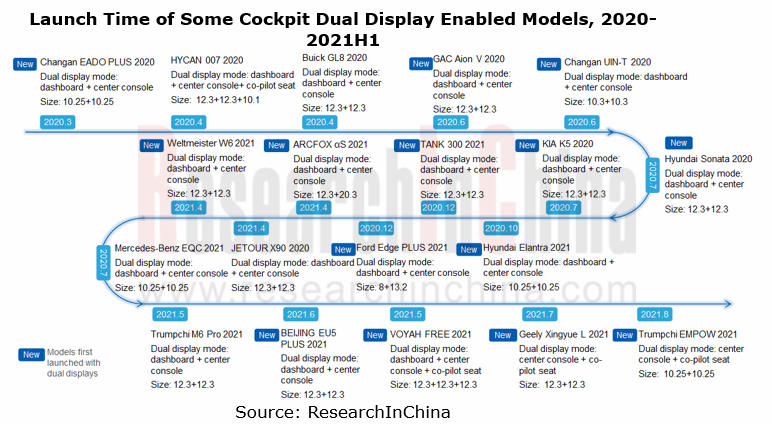
In 2021H1, the sales of models with console multi and dual displays surged by 61% and 155% on a like-on-like basis, respectively.
In spite of the downturn in overall passenger car sales in China, models with multi and dual displays bucked the trend and showed an aggressive growth in 2021H1. The sales of models with console multi-screen displays and cockpit dual displays shot up by 61% and 155% from the prior-year period, separately.
The booming sales of such models indicate how determined automakers are in cockpit disruption, and are also an evidence of their high acceptance in market. The positive effects given by automakers and the market have created an active and effective closed loop, which will make the sales of models with multi-screen and dual displays sustain rapid growth.
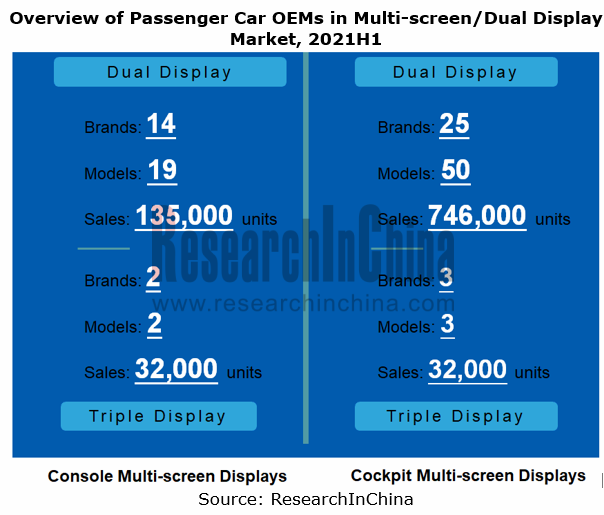
Chinese brands hold a more positive, more open attitude towards cockpit dual displays.
Still take cockpit dual display as an example. Homegrown brands in China have become the main drivers of cockpit dual display solutions in the first half of 2021, with a market share of 62.3%, among which Changan Auto is the most typical player followed by Hongqi and Jetour. In the joint venture brands, Hyundai, Ford and SOL have introduced several dual display-enabled models during 2020-2021H1.
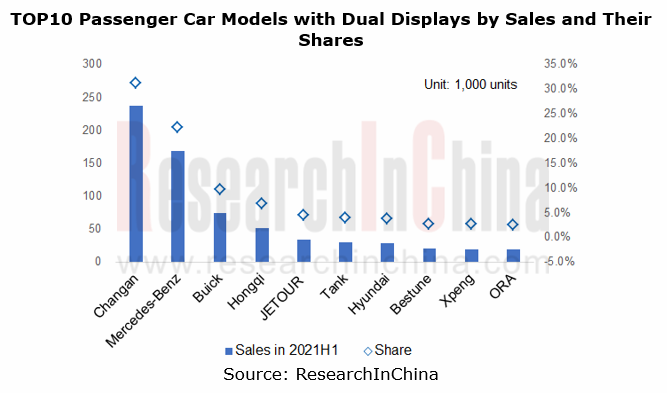
Chery is one of the earliest homegrown brands deploying dual displays and using one-chip, dual-display, dual-system solutions.
In October 2019, EXEED, a high-end brand under Chery introduced EXEED LX, its second model equipped with i-Connect@Lion 3.0 and 12.3-inch dashboard + 12.3-inch console dual-screen display. Differing from the previous versions, i-Connect@Lion 3.0 co-developed by Neusoft, Baidu and Intel enables a one-chip, dual-display, dual-system solution via ACRN hypervisor that runs on the Intel Apollo Lake processor.
This solution has become available to the full range of EXEED models, making the auto brand one of the few thorough implementers of dual displays and one-chip, dual-display, dual-system solutions in the auto industry.
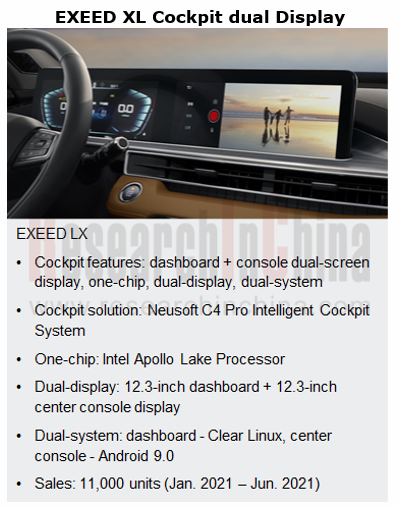
2. Chip vendors and Tier1 cockpit solution suppliers are strong advocates of one-chip, multi-display, multi-system solutions.
Simple technology upgrade is not enough to make cockpits intelligent in a substantial way. High performance chips such as Qualcomm, Renesas and Intel bring in a possibility for multiple operating systems to run on one chip, and also support several screens including LCD dashboard screen, center console screen and co-pilot entertainment screen.
Take Qualcomm SA8155 as an example: as the world’s first mass-produced 7nm automotive digital cockpit chip, the octa-core chip supports 4 2K screens or 3 4K screens, with the computing forces of CPU and GPU up to 80K DMIPS and 1142G FLOPS, respectively. Qualcomm SA8155 has provided one-chip, multi-display solution enablers for mass-produced models like AION LX, WEY Mocha and Xingyue L.
Automotive E/E architecture is shifting to a domain centralized one, which allows Tier1 cockpit suppliers to integrate different operating systems into the cockpit domain controller through hardware isolation or hypervisor technology, so as to realize the one-chip multi-system function on a single hardware platform for higher computational efficiency and lower cost.
One example is SmartCore, Visteon's latest cockpit domain controller which enables HMI seamless connection in multiple display domains such as digital cluster, infotainment and rear seat infotainment. On the strength of its powerful computing force, the Hypervisor-based SmartCore architecture running on two systems allows SmartCore solution to simultaneously drive digital cluster system, infotainment system, and body control system. SmartCore domain controller has provided one-chip, dual-system solution support for mass-produced models like Mercedes-Benz A-Class, AION LX and Xingyue L.
Globally, Tier1 cockpit suppliers both inside and outside China are racing to launch one-chip, multi-display, multi-system cockpit solutions based on high performance chip and cockpit domain controller.
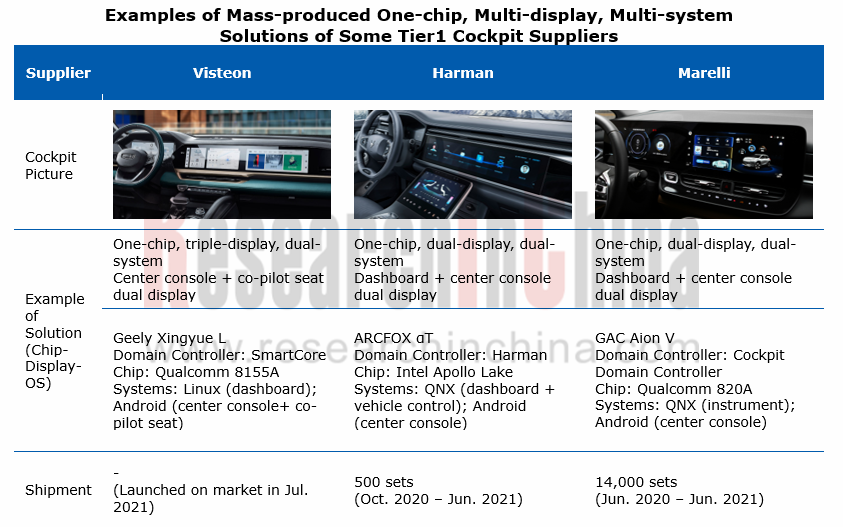
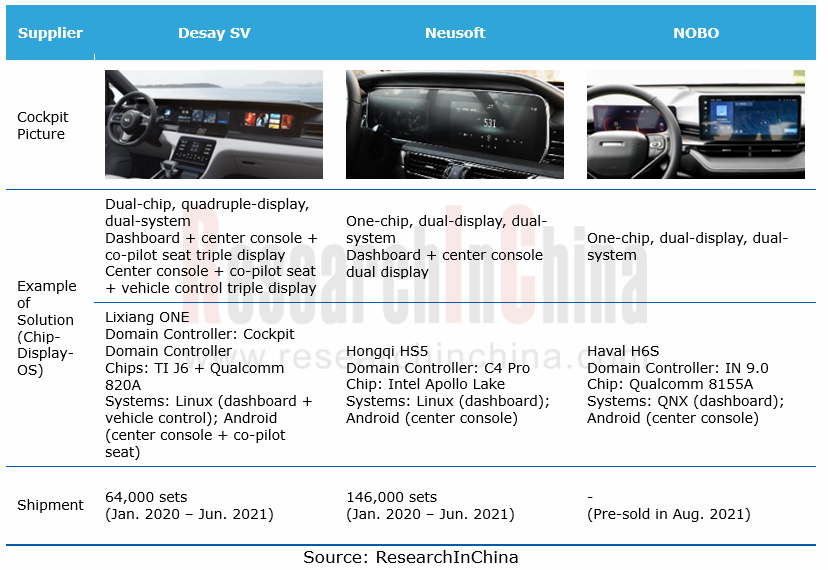
3. Challenges and Trends
Multi-screen and dual displays provide substantially better occupant experience in multiple aspects: in usability, both displays improve the interaction efficiency between people and vehicles to some extent and make it cheaper for users to obtain vehicle information and functions; in scalability, both of them expand the information load capacity of a cockpit and add more driving information and entertainment content.
Meanwhile, the upgrade of current cockpit industry chain technologies including chip, operating system, cockpit domain controller and display will leave more scope for OEMs to conceive and implement multi-screen and dual displays, helping to reshape cockpits technologically.
As concerns whether it is necessary to introduce multi-screen/dual display or one-chip, multi-display, multi-system solution into a car or not, automakers need to take into account a combination of factors such as product orientation, user needs, R&D costs and competitive pattern. As for cockpit interior structure, it is not the use or re-layout of displays that poses technical and cost challenges to OEMs, but how to improve user experience with multi-screen/dual displays of limited number and size, that are introduced into a cockpit based on redesigned software and hardware architecture, in an age of intelligent cockpits. This is really worth OEMs thinking about.
China Automotive Integrated Die Casting Industry Research Report, 2022
Integrated Die Casting Research: Upstream, midstream and downstream companies are making plans and layouts in this booming field
Automotive integrated die casting is an automotive manufacturing proce...
Emerging Automakers Strategy Research Report, 2022--Xpeng Motors
XPeng Motors Strategy Research: Landing Urban NGP and Expanding Three Branch BusinessesXPeng P7 drives overall sales growth, and three new models will be launched from 2022 to 2023 to drive new growth...
Global Passenger Car Vision Industry Report, 2022
Foreign automotive vision research: leading Tier 1 suppliers vigorously deploy DMS/OMS, and vital sign detection becomes a standard configuration for OMS.
1. The revenues of major Tier 1 suppliers in...
China Automotive Vision Industry Report, 2022
China automotive vision research: DMS is booming, with the installations soaring 141.8% year-on-year
1. China will install 75.4 million cameras in 2025
According to ResearchInChina, China installed ...
C-V2X (Cellular Vehicle to Everything) and CVIS (Cooperative Vehicle Infrastructure System) Industry Report, 2022
C-V2X industry research: C-V2X was pre-installed in more than 20 production passenger car models, with a penetration rate of over 0.5%.
More than 20 production passenger car models were equipped wit...
New Energy Vehicle Thermal Management System Market Research Report,2022
Thermal Management Research: Technological Innovation and Iteration Have Spawned Emerging Markets
The rapid development of Chinese new energy vehicles has brought more opportunities for parts and com...
CTP, CTC and CTB Integrated Battery Industry Research Report, 2022
Integrated battery research: three trends of CTP, CTC and CTB
Basic concept of CTP, CTC and CTB
The traditional integration method of new energy vehicle power system is CTM, that is, "Cell to Module...
China Driving Recorder Market Research Report, 2022
Driving recorder research: sales volume of passenger cars equipped with OEM DVRs increased by 52.5% year-on-year in 2022 H1
In April 2021, the Ministry of Industry and Information Technology s...
Autonomous Delivery Vehicle Industry Report, 2022
Research on autonomous delivery: the cost declines, and the pace of penetration and deployment in scenarios accelerate.
Autonomous delivery contains outdoor autonomous delivery (including ground-base...
China Autonomous Heavy Truck Industry Report, 2022
Autonomous heavy truck research: entering operation and pre-installed mass production stage, dimension reduction and cost decrease are the industry solution
ResearchInChina released "China Autonomous...
China Smart Parking Industry Report, 2022
Smart parking research: there are 4,000 players, and city-level parking platforms have been established.
Smart parking market shows great potentials, and Baidu, Alibaba, Tencent and Huawei (BATH) hav...
Automotive Head-up Display (HUD) Industry Report, 2022
Automotive HUD research: AR HUD is being largely mounted on vehicles, and local suppliers lead the way. 1. AR HUD is being used widely, with 35,000 vehicles equipped in the first half of 2022.
S...
Intelligent Vehicle E/E Architecture Research Report, 2022
E/E architecture research: 14 key technologies, and innovative layout of 24 OEMsKey technologies of next-generation electronic and electrical architectures (EEA)
The definition of next-generation E/E...
China Automotive Lighting Market Research Report, 2022
Automotive lighting research: the penetration of ambient lights has reached 31%, and intelligent lighting is reshaping the third living space.
Favorable policies and consumption upgrade help automake...
Global and China Automotive IGBT and SiC Research Report, 2022
1. In 2025, China's automotive SiC market will be valued at RMB12.99 billion, sustaining AAGRs of 97.2%.
Silicon carbide (SiC) devices that feature the resistance to high voltage and high frequency ...
Passenger Car Chassis Domain Controller Industry Report, 2022
Chassis domain controller research: full-stack independent development, or open ecosystem route?
Chassis domain consists of transmission, driving, steering and braking systems. Conventional vehicle ...
China Automotive LiDAR Industry Research Report, 2022
LiDAR research: Chinese passenger cars will carry over 80,000 LiDAR sensors in 2022
1. The mass production of LiDAR is accelerating, and the installations are expected to exceed 80,000 units in 2022
...
China Autonomous Driving Data Closed Loop Research Report, 2022
1. The development of autonomous driving is gradually driven by data rather than technology
Today, autonomous driving sensor solutions and computing platforms have become increasingly homogeneous, an...